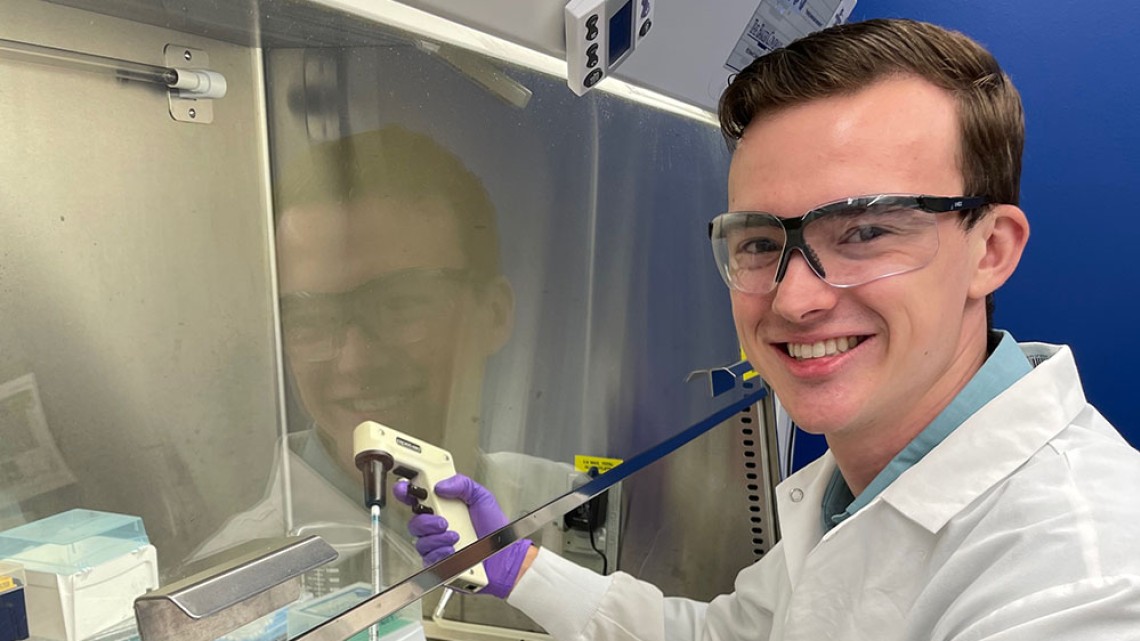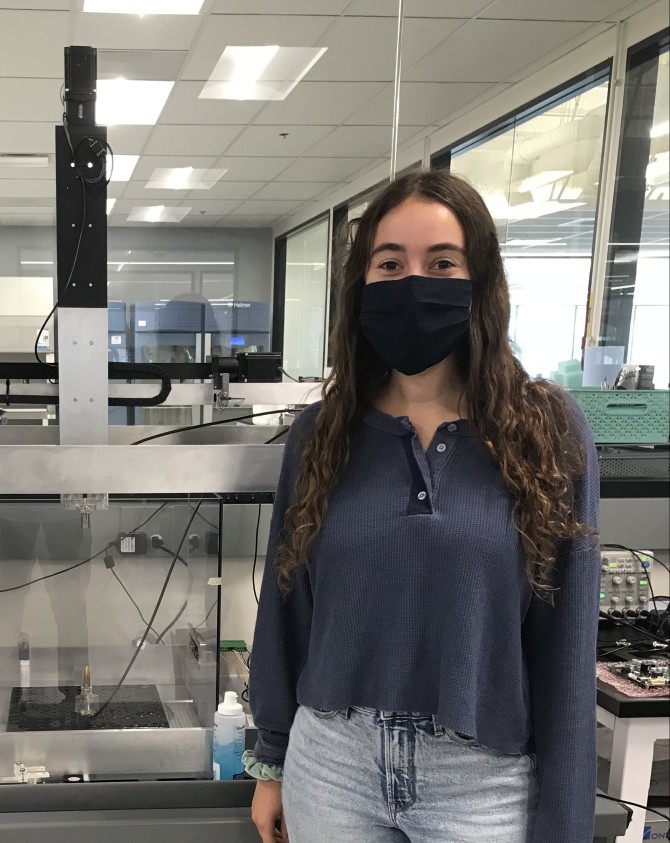
Jackson Bauer '22 completed a research associate internship in Cambridge, MA with Be Biopharma, a biotechnology startup developing engineered B cells for use in cellular medicines.
News directly from Cornell's colleges and centers
Gene editing, brand acquisition, neural dust: Kessler Fellows devote summer to startups
By Grace Collins
While some returning students left behind long days at the beach and summer barbecues, the student entrepreneurs in the 2021 cohort of the Kessler Fellows program returned to Ithaca this fall equipped with new entrepreneurial skills and ready to tackle their senior years after completing 10-week internships with startups around the nation.
Rooted in the College of Engineering, the Kessler Fellows program offers Cornell juniors the chance to fully immerse themselves in the world of entrepreneurship. After completing two entrepreneurship courses and consulting with a team of Entrepreneurs-in-Residence, career counselors, and research professionals during the spring semester, the fellows complete a summer internship at a startup of their choice. The fellows receive a weekly stipend — fully funded through the generosity of Andrew Kessler ‘80 — which allows them to spend the summer focused on their immersive startup experience.
From working on autonomous cleaning solutions to vegan leather textiles, this year’s participants were able to make an impact on startups across a wide variety of industries and disciplines. Four members of the 2021 cohort share what they gained from their startup summer.
Jackson Bauer ’22, Biomedical Engineering
Bauer spent the summer as a research associate intern with Be Biopharma, a Cambridge, MA biotechnology startup developing engineered B cells for use in cellular medicines. Utilizing the protein-producing powers of B cells, the startup is working to develop treatments to help patients with cancer and genetic diseases.
During his internship, Bauer assisted in the lab on a variety of bioengineering efforts such as performing and analyzing CRISPR—a technology used to edit genes—and synthesizing mRNA coding for therapeutically relevant genes.
“I learned so much more than I could have ever expected in a 10-week timeframe,” he said. “The fellowship certainly got me more excited about entrepreneurship and showed me that there is a clear—albeit difficult—path from research to company to patient.”
Bauer credits his mentors at the company, particularly Tim Mullen, Ph.D., for helping him develop his lab skills and take more creative approaches to problem solving, and cites a conversation series with founder Lea Hachigian, Ph.D. on translating academic research into a successful startup as a highlight of his summer and an inspiration for his future.
“Over the summer, I decided that I'll be applying to Ph.D. programs for this upcoming year after I saw just how valuable the degree was across so many different roles, not just in science but in business leadership, venture capital, and consulting as well,” said Bauer.
Maxwell Beck ’22, ILR, Information Science and Business
Beck’s summer was spent traveling between Miami and New York City for his internship with Unybrands, a firm that acquires and grows direct-to-consumer and Fulfillment by Amazon brands. As an investments and integration associate, he was part of a team responsible for mergers, acquisitions, and the integration of acquired companies. His core responsibilities included meeting with potential sellers, preparing and presenting investment memos to Unybrands’ investment committee on a weekly basis.
Beck had the unique opportunity to witness the company grow significantly — a cause for celebration at any startup. When he first came on board, Unybrands had completed a seed round of $25 million and employed a team of 20 people. By the end of the summer, the team had doubled in size and raised an additional $300 million.
“I was already interested in both entrepreneurship and investing before joining the Kessler program, but this summer, I was able pursue my passion for investing within the environment of an early-stage startup. I had the opportunity to work in two different cities, form close relationships with my co-workers, and impart a meaningful and lasting impact on the company,” said Beck.
“This internship was a defining experience in helping me ascertain the intersection of my skills and passions, and I look forward to giving back to future Kessler Fellows and entrepreneurs at Cornell.”
Emma Kranich ’22, Electrical and Computer Engineering
Kranich headed west to Alameda, CA, where she was a systems engineering intern at iota Biosciences, a startup creating ultra-small “neural dust” devices to empower the future of bioelectronic medicine. Using technology invented at the University of California, Berkeley, iota’s biomedical implants can interface directly with the body’s central nervous system, allowing doctors to get closer to internal causes of disease.
At iota, Kranich was primarily responsible for creating a new communication method between the implants and an external transducer device. For this project, she developed a circuit and was able to see the entire process through, beginning at the ideation process using simulations and resulting in a patent disclosure sent to iota lawyers. She also worked on other business projects related to patent law and FDA applications, allowing her to broaden her knowledge and skillset. In addition to the hands-on lab experience, she was able to connect with people from a diverse range of professional backgrounds.
“Going into the summer, I wasn't sure what I wanted to do after college. I knew I wanted to work on something impactful in the bioelectronic or biomedical field and thought working at a startup or getting a Ph.D. would be the best route for that. Being a Kessler Fellow allowed me to talk to many different people about how their careers progressed and learn from their successes and mistakes,” said Kranich.
“Although most of the people I worked with had some graduate degree — which I do want to obtain at some point — I realized that I don't necessarily need one to work at a place like iota Biosciences because the Kessler fellowship helped me get my foot in the door.”
Alex LoCicero ’22, Mechanical Engineering
As a mechanical engineering intern, LoCicero worked with Healing Innovations, a Nashville, TN startup creating neurorehabilitation devices to help people walk again after neurological injuries. During his internship, LoCicero was able to perform high-impact CAD modeling and 3D printing that was implemented into final designs of in-clinic devices and an in-home device being developed alongside the Veterans Association of America.
“I was given a lot of responsibility as an intern which allowed me to learn a lot quickly,” said LoCicero.
Because Healing Innovations is a smaller startup, LoCicero was also to take on additional responsibilities outside of his main mechanical engineering focus, including exposure to biomechanics, patent law, design failure mode and effect analysis (DFMEA), sourcing, and marketing.
“Working at a small company is a great way to make a large impact on a product early in your engineering career,” said LoCicero. “I will definitely be looking to work at small companies post-graduation to accelerate my growth as a designer. I was also grateful for the opportunity to join a tight-knit group at Healing Innovations. With such a small group, the whole company was able to eat lunch together most days, and I felt like I got to know everyone extremely well by the end of the summer.”
Recruitment is currently underway for the 2021-22 cohort of Kessler Fellows. The program is open to any student at Cornell University in their junior year. Interested students should submit an application by November 1.
Media Contact
Get Cornell news delivered right to your inbox.
Subscribe

